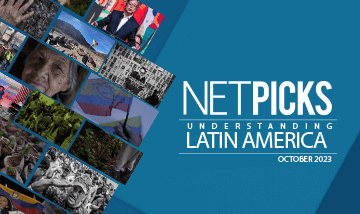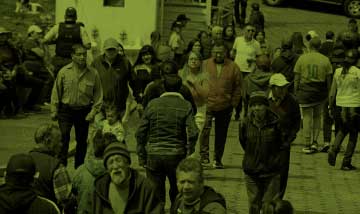Índice
- Understanding Latin America
- PERUVIANS REJECT POLITICS AS USUAL
- BRAZIL: 2020 MUNICIPAL ELECTIONS MARK THE RISE OF DIVERSITY IN THE COUNTRY’S POLITICAL LANDSCAPE
- ON THE BACK OF THE PANDEMIC, THE MILITARIZATION OF LATIN AMERICA IS GATHERING MOMENTUM, ANALYSTS WARN
- THE ‘FALSE POSITIVES’ SCANDAL THAT FELLED COLOMBIA’S MILITARY HERO
- CHILE’S MAPUCHE INDIGENOUS GROUP FIGHTS FOR RIGHTS
Understanding Latin America
Dear readers and colleagues, this will be the last Netpicks for 2020; we hope our selections over the past year have provided you with some insights into life here in Latin America. Our next publication date will be the first days of February, 2021. In the meantime, we wish you all the very best for a holiday season unfortunately marred by the Covid 19 pandemic, and share with you our hopes for a happy, Trump free 2021 for all of us.
This month we bring you five articles:
- Peruvians reject politics as usual.
- Brazil: 2020 municipal elections mark the rise of diversity in the country’s political landscape.
- On the back of the pandemic, the militarization of Latin America is gathering momentum, analysts warn.
- The ‘false positives’ scandal that felled Colombia’s military hero.
- Chile’s Mapuche indigenous group fights for rights.
.
PERUVIANS REJECT POLITICS AS USUAL
The recent destitution of Peruvian President Martin Vizcarra, led to accusations of a legislative coup and demonstrations of a size and intensity rarely seen in the country. Vizcarra’s replacement, Manuel Merino, lasted only a few days in the face of protests and the subsequent deaths of two young people due to police repression. The demonstrations were not, however, a matter of support for Vizcarra, but an expression of more wide ranging dissatisfaction, particularly amongst young people, many of whom have little knowledge of the country’s previous turbulent decades. The demand for a new constitution that resulted from the protests, is an expression of the level of that general dissatisfaction with the direction of the country, and with legislators submerged in a tide of corruption and political infighting. And though the Peruvian left has made incremental gains over the last decade, it is not widely seen as a major actor in the protests and may struggle to turn the dissatisfaction to its advantage in the upcoming presidential elections. A more radical stance might help, says the author, but a more likely scenario, he suggests, is that the Centre Right Partido Morado of the now interim President, Francisco Sagasti, the only party to vote against Vizcarra’s destitution, could end up with a definitive Presidency and control of the Congress in 2021.
Néstor David Pastor, November 20th, 2020
https://nacla.org/news/2020/11/20/peruvians-reject-politics-usual
.
BRAZIL: 2020 MUNICIPAL ELECTIONS MARK THE RISE OF DIVERSITY IN THE COUNTRY’S POLITICAL LANDSCAPE
Perhaps the major surprise of the November 15th municipal vote, the first country wide elections since Jair Bolsonaro became Brazilian President, was not that many candidates sponsored by the President lost, but the level of both participation and success of Trans, black/Quilombola, and indigenous candidates. Dozens of transsexual women were elected to the city councils of major cities, and in all 25 Trans candidates were successful, an increase of more than 200% compared to the 2016 elections. In São Paulo, the country’s largest city, and capital of the State of the same name, a Trans woman won over 50 thousand votes, and at the age of 27 was the most voted woman among those elected. The rise of black women was also one of the striking aspects of the elections. In Porto Alegre, capital of Rio Grande do Sul State, Karen Santos was the most voted councilor; she was elected together with three other black women. Twenty twenty was also the year with the highest indigenous participation in the polls, with 2,177 candidates, representing a 27% increase on the 2016 elections. Despite the fact that spheres of power in Brazil are still dominated by older, wealthy, white, heterosexual men, this year’s municipal elections appear to have shaken that historically exclusive system.
Pedro Rafael Vilela, translated by Ítalo Piva, November 21st, 2020
https://www.brasildefato.com.br/2020/11/21/2020-election-marks-the-rise-of-diversity-in-the-country-s-political-landscape
.
ON THE BACK OF THE PANDEMIC, THE MILITARIZATION OF LATIN AMERICA IS GATHERING MOMENTUM, ANALYSTS WARN
The lack of institutional strength in most Latin American countries could lead to a strengthened military presence after the Covid 19 is over, according to analysts. While the role of the military in organizing and distributing assistance in the Covid-19 pandemic would have been difficult to replicate by other means, historic institutional weakness may lead to their role being consolidated and expanded in coming years. The danger is that as well as a supporting role, the military may also be encouraged to suppress opposition and protest, as has taken place during the lockdowns in a number of countries of the region. In Peru, for example, more than 18,000 people were detained during the first weeks of lockdown. An enlarged presence does not imply another round of Coup de D’états, rather that an expanded military role will imply a greater share of national budgets as well as an increase in influence over, and ability to question civilian governments. In a scenario in which democratically elected administrations and democracy itself are increasingly questioned, the military will almost certainly be inclined assume greater protagonism in the face of what they consider to be ‘incompetent’ regimes. The civilian protest movements that have also increased in strength in a number of countries may, however, provide some level of counterbalance.
Maurizio Guerrero, November 6th, 2020
https://www.equaltimes.org/on-the-back-of-the-pandemic-the?lang=en#.X8llJKpKjwe
.
THE ‘FALSE POSITIVES’ SCANDAL THAT FELLED COLOMBIA’S MILITARY HERO
General Mario Montoya was a national hero, leading the Colombian army at a time when the insurgent Fuerzas Armadas Revolucionarias de Colombia (FARC) were basically forced the bargaining table. Montoya, also responsible for the operation that brought one time presidential hopeful Ingrid Betancourt’s eight year captivity to an end, was promoted by President Uribe as a national champion, a central figure in the apparently successful policy of ‘Democratic Security’. But not everything was as it seemed. The dark side of Montoya’s ‘success story’ was eventually revealed: the disappearance of large numbers of generally poor young men, who later reappeared as ‘guerrilla fighters’ killed by the army. These were the notorious ‘false positives’, and they brought Montoya’s career to an end. There were, according to sources, between 2,500 and 5,000 of them, killed because, according to the author, Montoya demanded numbers and didn’t care that much how they were obtained; money was offered to army units based on the number of insurgents brought down. Montoya, who denies involvement in the ‘false positives’, has testified under the Special Jurisdiction for Peace, (JEP), and could possibly face a sentence of 20 years. But as Alvaro Uribe’s military champion and close collaborator, the process has implications that go well beyond the ex-general’s personal fate.
Mariana Palau, November 19th, 2020
https://www.theguardian.com/world/2020/nov/19/colombia-false-positives-killings-general-mario-montoya-trial
.
CHILE’S MAPUCHE INDIGENOUS GROUP FIGHTS FOR RIGHTS
The vote for a new constitution in Chile has raised hopes amongst the Mapuche, the country’s major indigenous group, that long hoped for change could finally arrive. Before the appearance of the Spanish, the Mapuche, who presently make up around 12% of the country’s population, occupied large territories in an area of southern Chile known as Araucanía. But their presence, and resistance, has always been a thorn in the side of governments with little interest in them, but with a lot of interest in appropriating their lands. The latest of examples were the large tracts of traditional Mapuche territory that were handed over to rich families and forestry companies during the dictatorship of General Pinochet. But more than land is at stake. The present Constitution, also drawn up during the Pinochet years, does not even recognize the existence of the Mapuche, their culture, or customs such as traditional medicine. The lack of recognition and the loss of land have led to anger and violent resistance, but there is hope that disputes could resolved if the new constitution includes the Mapuche’s principal claims.
Jane Chambers, November 27th, 2020
https://www.bbc.com/news/world-latin-america-55042838





